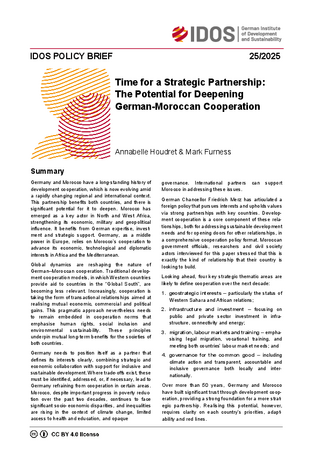Time for a strategic partnership: the potential for deepening German-Moroccan cooperation
Houdret, Annabelle / Mark FurnessPolicy Brief (25/2025)
Bonn: German Institute of Development and Sustainability (IDOS)
DOI: https://doi.org/10.23661/ipb25.2025.v1.1
(DOI 10.23661/ipb25.2025 is no longer available)
Frz.. Ausg. u.d.T.:
Vers un partenariat stratégique : Le potentiel de la coopération germano-marocaine
(IDOS Policy Brief 24/2025)
Dt. Ausg. u.d.T.:
Zeit für eine strategische Partnerschaft: das Potenzial der Zusammenarbeit Deutschland-Marokko
(IDOS Policy Brief 26/2025)
Germany and Morocco have a long-standing history of development cooperation, which is now evolving amid a rapidly changing regional and international context. This partnership benefits both countries, and there is significant potential for it to deepen. Morocco has emerged as a key actor in North and West Africa, strengthening its economic, military and geopolitical influence. It benefits from German expertise, investment and strategic support. Germany, as a middle power in Europe, relies on Morocco’s cooperation to advance its economic, technological and diplomatic interests in Africa and the Mediterranean.
Global dynamics are reshaping the nature of German–Moroccan cooperation. Traditional development cooperation models, in which Western countries provide aid to countries in the “Global South”, are becoming less relevant. Increasingly, cooperation is taking the form of transactional relationships aimed at realising mutual economic, commercial and political gains. This pragmatic approach nevertheless needs to remain embedded in cooperation norms that emphasise human rights, social inclusion and environmental sustainability. These principles underpin mutual long-term benefits for the societies of both countries.
Germany needs to position itself as a partner that defines its interests clearly, combining strategic and economic collaboration with support for inclusive and sustainable development. Where trade-offs exist, these must be identified, addressed, or, if necessary, lead to Germany refraining from cooperation in certain areas. Morocco, despite important progress in poverty reduction over the past two decades, continues to face significant socio-economic disparities, and inequalities are rising in the context of climate change, limited access to health and education, and opaque
governance. International partners can support Morocco in addressing these issues.
German Chancellor Friedrich Merz has articulated a foreign policy that pursues interests and upholds values via strong partnerships with key countries. Development cooperation is a core component of these relationships, both for addressing sustainable development needs and for opening doors for other relationships, in a comprehensive cooperation policy format. Moroccan government officials, researchers and civil society actors interviewed for this paper stressed that this is exactly the kind of relationship that their country is looking to build.
Looking ahead, four key strategic thematic areas are likely to define cooperation over the next decade:
1. geostrategic interests – particularly the status of Western Sahara and African relations;
2. infrastructure and investment – focusing on public and private sector investment in infrastructure, connectivity and energy;
3. migration, labour markets and training – emphasising legal migration, vocational training, and meeting both countries’ labour market needs; and
4. governance for the common good – including climate action and transparent, accountable and inclusive governance both locally and internationally.
Over more than 50 years, Germany and Morocco have built significant trust through development cooperation, providing a strong foundation for a more strategic partnership. Realising this potential, however, requires clarity on each country’s priorities, adaptability and red lines.



